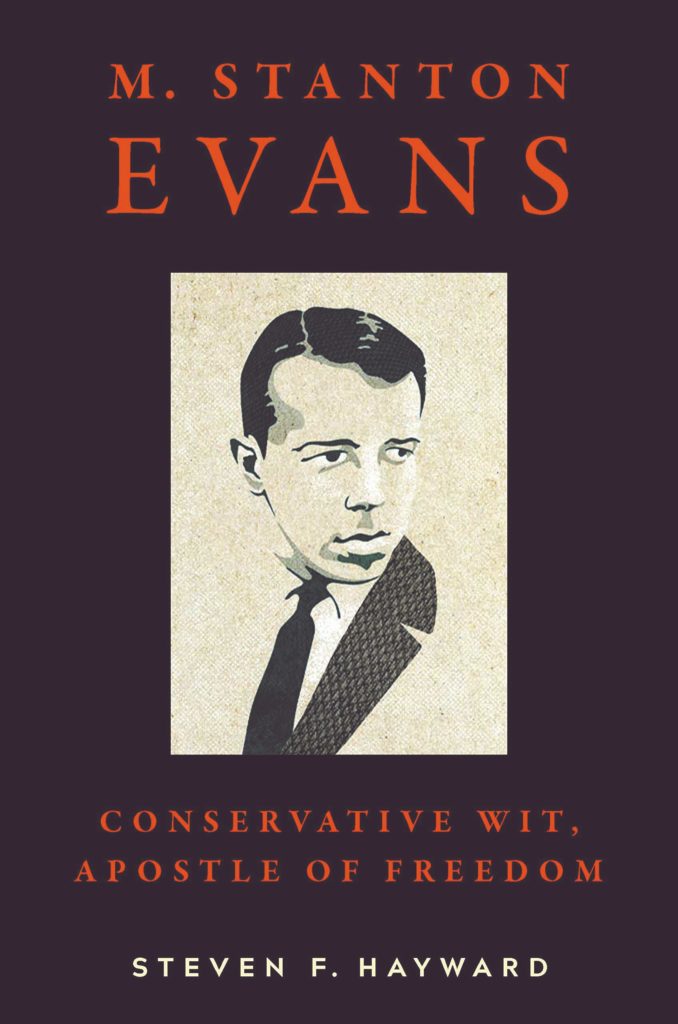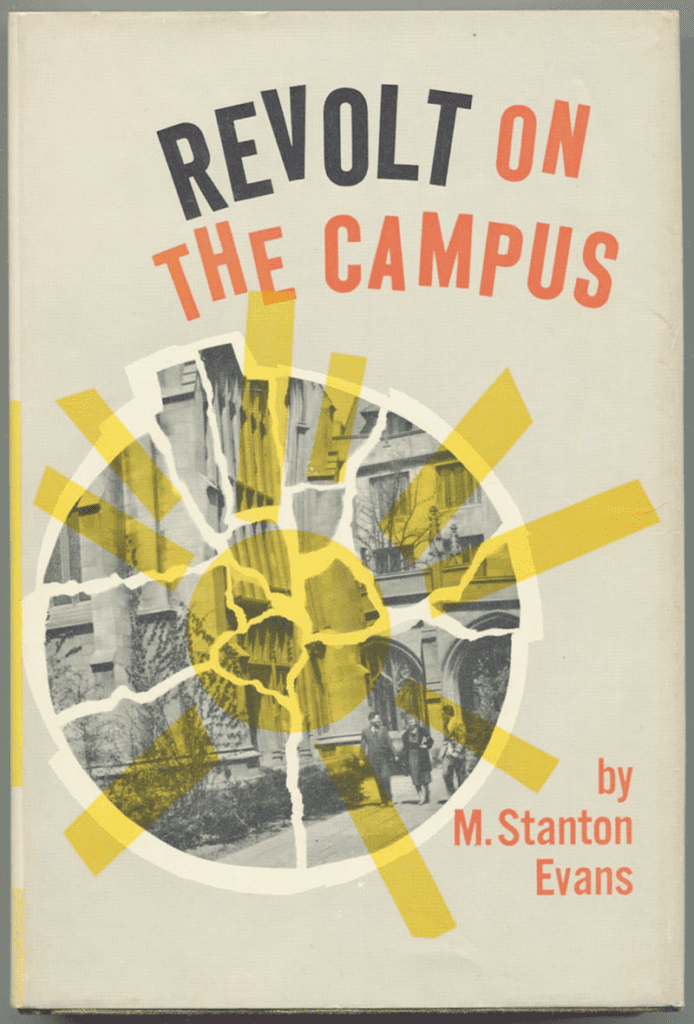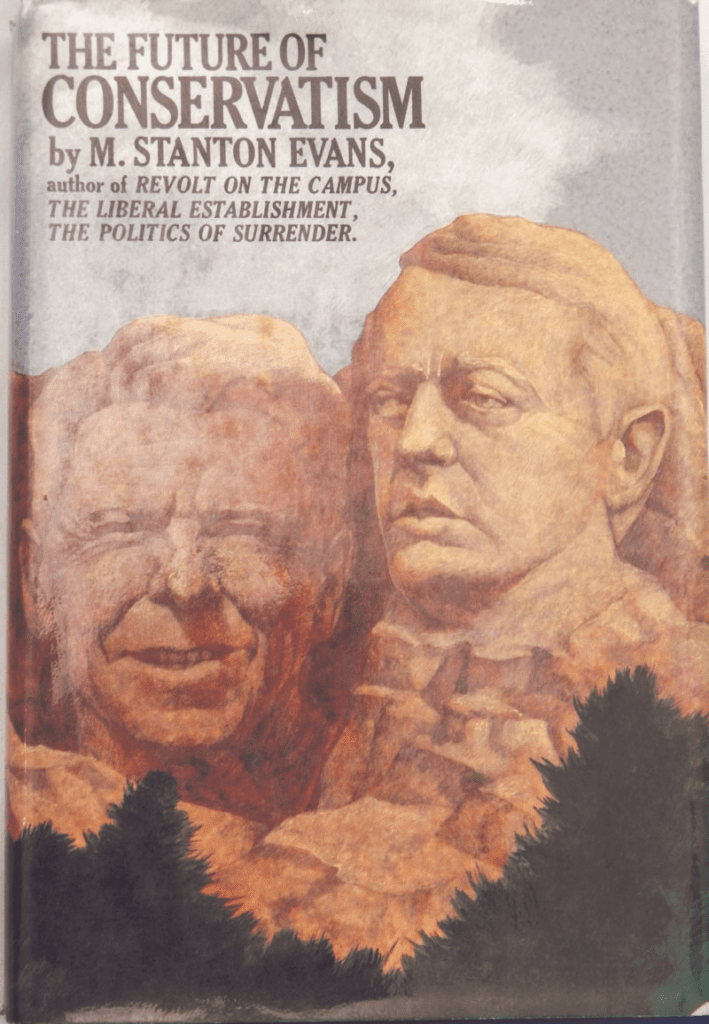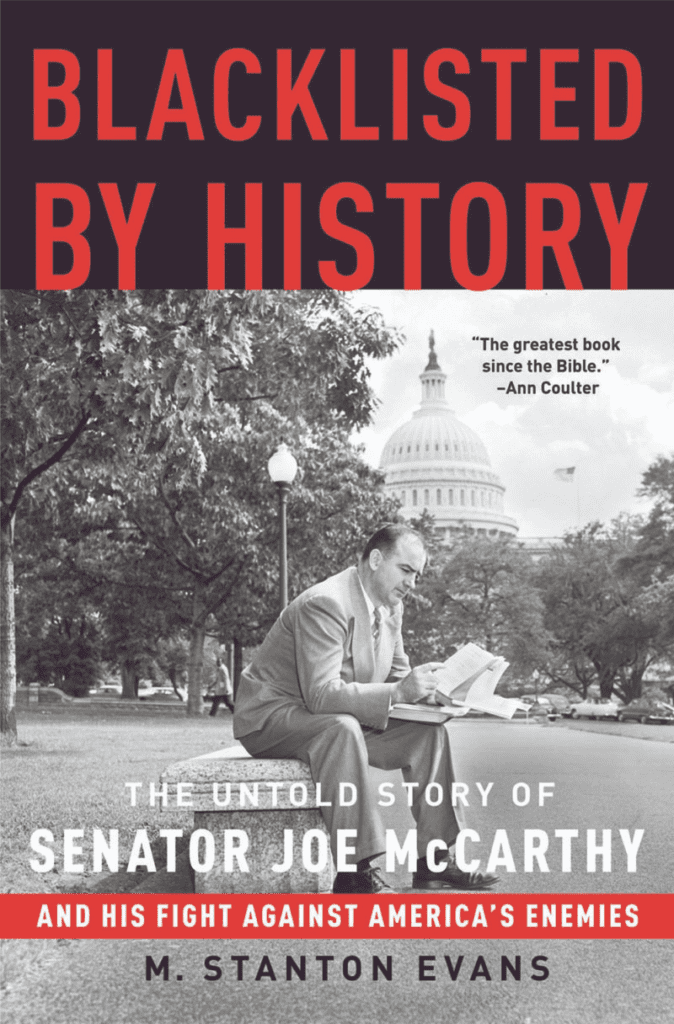
In 1970, American conservative intellectual William F. Buckley, Jr., told Playboy magazine that the biggest problem facing the conservative movement was “a scarcity of good writers and journalists.” What seemed like a yawning shortfall then has since become a wild oversupply, as anyone chasing a career in right-wing print media these days can attest. Buckley put part of his money where his mouth was by founding National Review, but that denser pipeline of talent was almost single-handedly the work of M. Stanton Evans, to whom “thousands of activists and journalists,” writes Berkeley lecturer Steven F. Hayward in a new book, “owe their lives and livelihoods.” Yet Evans “is not well known among the rising conservative generation,” Hayward remarks in the book’s introduction. Thus, his work aims to acquaint readers with this unsung conservative hero.
Hayward’s biography portrays three key attributes of Evans, only the last of which Buckley, who was nine years his senior but passed seven years earlier, thoroughly lacked: his legendary wit (a sampler of Evans’ greatest quips is appended at the book’s end), his embrace of big-tent fusionism (he was “a key figure in the transition of postwar conservatism from being merely an intellectual movement to a political one that aimed to win”), and his warmth and generosity.
The sobriquet that entitles this review was coined by Daniel Oliver, who, by being in the overlapping orbits of both Evans and Buckley, could attest first-hand to the two men’s kindred brilliance, but also to their differing characters. Evans followed in Buckley’s footsteps to Yale in the fall of 1951 but came short by a few months of overlapping with him. While Buckley got busy upon graduation promoting his broadside against Yale’s liberal faculty, God and Man at Yale (1951), Evans busied himself with more humble pursuits, such as placing features in The Freeman, helping jumpstart Frank Chodorov’s Intercollegiate Society of Individualists (today the Intercollegiate Studies Institute), and founding the Party of the Right (a subgroup within Ed Meese’s Yale Political Union, a university debate society). Although he often felt like he merely stood in Buckley’s shadow, Evans was no less ambitious, and it would only be a matter of time before national success came knocking on his door too. His early career alternated several stints at various publications—The Freeman, National Review, Human Events—a function of the patchy conservative mediascape of the early 1950s.
Evans’ move from Buckley’s ‘high-church’ National Review to Frank Chodorov’s more ‘pugilistic’ Human Events, where he was made managing editor in 1958, added to his style a lasting tinge of lowbrow bellicosity. It was at Human Events that Evans discovered the vocation for which he is best known, teaching journalism. He unofficially served as ‘housemaster’ to the many DC-lodged interns in town to cover Congress through ISI’s Human Events School of Journalism, a distant prequel to the more famous National Journalism Center (NJC). In 1959, he left New York to join Eugene C. Pulliam’s Indianapolis News as an editorial writer, with ample leeway to opine on national and global events whilst speaking at numberless local groups and campuses. Stylistically, the 1960s saw Evans develop a uniquely contrarian streak and a knack for detail on full display in his countless editorials roasting climate alarmism or alerting of Soviet espionage. “It’s not so much that he was a natural contrarian,” writes Hayward in a line that reads like Evans’ advice to every young journalist, “rather, he regarded mainstream journalism to be superficial and thought it always paid to probe deeper into the facts and reject groupthink.”

In ideological terms, the late 1950s and 1960s positioned Evans at the beating heart of an evolving conservative movement, straddling the boundaries between its ‘individualist’ and ‘traditionalist’ wings. The epitome of a fusionist, Evans envisioned the proverbial stool’s three legs to be of a piece. He didn’t fear that a hard-edged libertarianism would undermine virtue; rather, he thought freedom and virtue could advance in unison. These big-tent credentials doubtless played a role in propelling Evans to ghostwrite the famous Sharon Statement at the 1960 conservative gathering in Bill Buckley’s estate near the namesake Connecticut town that spawned Young Americans for Freedom. If the Sharon Statement is often held up as the right-wing analog of the more famous Port Huron Statement that launched the Students for a Democratic Society two years later, it is in part because the two statements, written with similar aims in mind, couldn’t be more stylistically at odds; the latter a word soup of post-modern mantras, the former written in Evans’ classically pristine, crisp prose. On his trip back from Sharon, Evans was promoted to editor-in-chief, helping the Indianapolis News consolidate, in Hayward’s terms, “arguably the most consistently conservative editorial page in the nation.”
Evans thus approached the 1960 election as a leading conservative opinion maker. Though he resented Nixon’s attempts to placate Nelson Rockefeller’s liberal wing of the GOP, the prevailing imperative was to beat John F. Kennedy, a man whom Evans viewed as lustful of power, and he even debated Arthur Schlesinger, Jr., on Nixon’s behalf two days before the race. For Evans, Kennedy’s New Frontier amounted to illiterate economics. One famous quip from this period befits Joe Biden’s economic fumbles: “the view that price increases cause inflation is like saying wet sidewalks cause rain.” More crucially, Evans feared that liberals’ dislike of the USSR was insincere, or, in Hayward’s terms, that “it was technocratic, not moral.” Throughout the 1960s détente, Evans consistently expressed a hardline strain of anti-communism, pressing the Kennedy administration to emulate the Soviets in using proxy forces.
The year 1962 shook his personal life in two ways: he married his wife, and he saw his father Medford ejected out of National Review for his Bircher links, a move that further marked Evans out, by comparison to the more radical Medford, as an establishment conservative. The 1960s were momentous organizationally too, with Evans penning statements of purpose for the Philadelphia Society and the American Conservative Union (ACU). True to fusionist form, he expended most of his intellectual firepower that decade lambasting the Great Society not only as a waste of taxpayer dollars but also as an erosion of virtue, something he called “the infantilization of American culture.” Alas, the remaining energy had to be spent policing his own side. Evans backed Reagan’s bid for President as early as 1968 on the grounds that only he could fend off a challenge from George Wallace, whilst the conservative establishment learnt from Goldwater’s defeat four years earlier to stick with the more moderate Nixon, someone Evans considered a “handmaiden to liberalism.”

In 1971, Evans entered radio as a contributor to CBS’ “Spectrum” and immediately sued his new employer on the grounds that CBS’ compulsory union membership violated the First Amendment. That same year, he succeeded John Ashbrook as chairman of the ACU and led the group’s campaign against Nixon advisor Daniel Patrick Moynihan’s Family Assistance Plan. The administration would keep disappointing Evans in various ways, eliciting such memorable quips as “there are only two things I dislike about Nixon: his domestic policy and his foreign policy.” In response to the 1972 opening to China and out of a near-vendetta against that policy’s mastermind, Henry Kissinger, Evans was called on to draft the statement of the Manhattan Twelve group of conservative intellectuals who publicly withdrew their support for Nixon over that opening. Domestically, Evans developed an expert’s flair for the workings of the administrative state and for healthcare policy. He lampooned Nixon’s fiscally lax policies through a paradigm where the economy and social mores were intimately connected, or, in Hayward’s terms, one where “the most practical way to promote virtue is to cut federal spending dramatically.”
About Nixon’s downfall, Evans famously quipped, ironically casting him in the opposite ideological direction to the wave of conservative defections following the scandal, that he “didn’t support Nixon until after Watergate!” His sincere assessment was doubtless more somber, reckoning that corruption is evil, yes, but that it’s also a self-interested response to incentives. “We shall rue the day,” he wrote about the scandal’s fallout in 1974, “when we permitted a President to be whipped from office in this fashion.” That same year, Evans resigned from National Review, presumably over the magazine’s decision to hire George Will in his stead as literary editor, allowing him to laser-focus on building the conservative movement’s infrastructure as chairman of ACU leading up to Reagan’s election. He founded CPAC (read: revived Human Events’ earlier version of the gathering) and even toyed with William Rusher’s idea of forming a conservative party to the GOP’s right. In 1977, Evans upped his efforts to inculcate into the next generation of journalists a knack for fact-finding and policy minutiae—“substantive reporters,” he once said, not “transmission belts for politicians’ quotes”—by setting up ACU’s Education and Research Institute (ERI), the bootcamp for aspiring reporters that was later renamed National Journalism Center. In 1980, he took over Consumer’s Digest magazine and began a twenty-year teaching career at Troy University.
Reagan’s election would be the ultimate test of the so-called Evans’ law (“whenever one of our people reaches a position of power where he can do us some good, he ceases to be one of our people”), and, much like previous ones, it didn’t go the way conservatives hoped. Evans acknowledged Reagan’s instincts towards reducing the scope of government, but he faulted him for not doing enough to “assert his views against the pragmatists” in his administration, namely James Baker and Richard Darman.
The early 1980s saw Evans make moves to influence federal policy by setting up the Chesapeake Society of conservative Capitol Hill staffers and the Inchon Forum of White House aides (“a beachhead behind enemy lines”), and later the famous Monday Club of weekly meetings. In 1982, he was yet again called on by fellow conservative intellectuals to draft the so-called “Mayflower Statement” expressing lukewarmth about the administration’s personnel and policy orientations. As Reagan’s second term gave way to George H. Bush’s first, Evans retreated from the front row of politics to the longer-term concerns of institution-building, writing in 1988 that “conservatives need to see the Reagan era not as the end of a process, but the beginning of one.”

In the book’s epilogue, Hayward goes somewhat out of his way to make his moving, expertly researched biography a tad timelier by connecting Evans’ thought and politics to Trumpism. “In each policy area, along with his embrace of conservative populism,” he writes, “we can see in Evans’ independent views a foreshadowing of the shift among conservatives that erupted fully with Trump’s arrival in 2016.” This filiation merits deeper analysis. Granted, Evans envisioned the need for the GOP to grow its appeal beyond the country club, which it partly did under Reagan. But if he ever sounded radical or populist, it was because Evans helped launch the conservative movement’s journey from being a handful of brainy outcasts to a national political force. These days, the conservative movement seems far too splintered and at odds with itself to produce intellectuals with anything like Evans’ big-tent appeal. That gives the reader another reason, if there needed to be one, to pick up a copy of Hayward’s excellent book.
This essay appears in the Summer 2022 edition of The European Conservative, Number 23: 88-91.